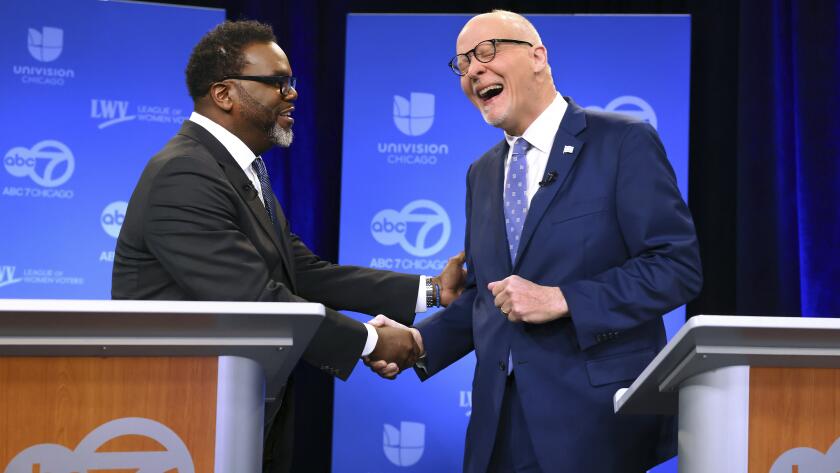Johnson elected Chicago mayor in victory for progressives
Former teacher and union organizer Brandon Johnson has been elected Chicago mayor. The win is a major victory for the Democratic Party’s progressive wing as the nation’s third-largest city grapples with high crime and financial challenges.
CHICAGO — Brandon Johnson, a union organizer and former teacher, was elected Chicago mayor Tuesday, a major victory for the party’s progressive wing as the nation’s third-largest city grapples with high crime and financial challenges.
Johnson, a Cook County commissioner endorsed by the Chicago Teachers Union, won a close race over former Chicago schools CEO Paul Vallas, who was backed by the police union. Johnson, 47, will succeed Lori Lightfoot, the first Black woman and first openly gay person to be the city’s mayor.
Lightfoot became the first Chicago mayor in 40 years to lose her reelection bid when she finished third in a crowded February contest. The top two vote-getters, Vallas and Johnson, advanced to Tuesday’s runoff after no candidate was able to secure over 50% to win outright.
Johnson’s victory topped a remarkable trajectory for a candidate who was little-known when he entered the race. He climbed to the top of the field with organizing and financial help from the politically influential Chicago Teachers Union and high-profile endorsements from progressive Sens. Bernie Sanders and Elizabeth Warren. Sanders appeared at a rally for Johnson in the final days of the race.
It was a momentous win for progressive organizations such as the teachers union, with Johnson winning the highest office of any active teachers union member in recent history, leaders say. It comes as groups such as Our Revolution, a powerful progressive advocacy organization, push to win more offices in local and state office, including in upcoming mayoral elections in Philadelphia and elsewhere.
The contest surfaced longstanding tensions among Democrats, with Johnson and his supporters blasting Vallas — who was endorsed by Sen. Dick Durbin of Illinois, the chamber’s second-ranking Democrat — as too conservative and a Republican in disguise.
Among the biggest disputes between Johnson and Vallas was how to address crime. Like many U.S. cities, Chicago saw violent crime increase during the COVID-19 pandemic, hitting a 25-year high of 797 homicides in 2021, though the number decreased last year and the city has a lower murder rate than others in the Midwest, such as St. Louis.
Vallas, 69, said he would hire hundreds more police officers, while Johnson said he didn’t plan to cut the number of officers, but that the current system of policing isn’t working. Johnson was forced to defend past statements expressing support for “defunding” police — something he insisted he would not do as mayor.
Instead, he said, he planned to allocate more money to areas such as mental health treatment and youth jobs.
Johnson also released a plan calling for $800 million in new taxes, which he said would be imposed on wealthy people and businesses, while freezing property taxes. Vallas, who had strong support from the business community, said the tax plan would be disastrous for Chicago’s economy.
More to Read
Sign up for Essential California
The most important California stories and recommendations in your inbox every morning.
You may occasionally receive promotional content from the Los Angeles Times.











